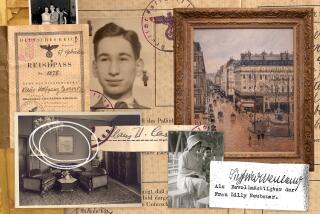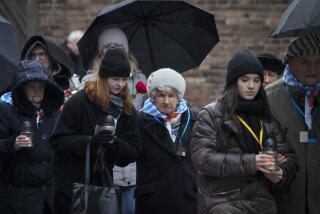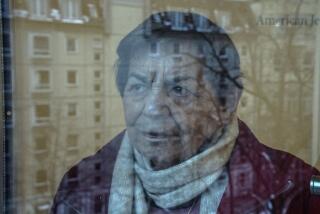George Brown dies at 81; Holocaust survivor
George Brown, who survived the horrors of the Holocaust to become an eloquent voice sharing his family’s tragedy with a new generation, has died. He was 81.
Brown died June 18 at Kaiser Permanente Woodland Hills Medical Center of a heart attack, said his daughter, Debbie Belkin.
FOR THE RECORD:
George Brown obituary: In the obituary of Holocaust survivor George Brown in the July 2 LATExtra section, the name of the Nazi labor camp Wolfsberg was misspelled as Wolsberg. Also, the article gave the location of Wolfsberg and the Auschwitz-Birkenau concentration camp as Poland, but it should have noted that the country was under Nazi occupation and that the camps were German-run. —
He spent several years volunteering with the Museum of Tolerance in Los Angeles to retell his family’s harrowing experience. His parents, two brothers and sister all died in the Holocaust. As World War II neared its end, Brown’s father made him promise to tell people what had happened.
“The story of horror that he told, the endless grief and pain that never left him for half a second did not prevent him from seeing good in people and giving hope to others,” said Liebe Geft, Museum of Tolerance director.
Brown spoke to schools and religious groups and traveled to several states, his daughter said. Holocaust survivors volunteer at the Museum of Tolerance to share their memories, and video conferencing is used with non-local groups.
He was born Gyorgy Braun on Feb. 12, 1929, in Mateszalka, Hungary, the youngest of four children to Moritz and Matild Braun.
He was 15 when Germany invaded his country in March 1944, and his family was forever changed.
That May, they were given 30 minutes to pack before being sent with other Jews to a ghetto, where they had to share one bedroom with two other families. In June, they were shipped to the Auschwitz-Birkenau concentration camp in Poland.
“Auschwitz didn’t have sunshine. The sky was full of ashes,” he told the Wenatchee (Wash.) World in 1995. “There were no birds, no butterflies. Only death.”
In his speeches, Brown recounted in chilling detail what happened to his family.
His mother and his sister, Lili, were separated from the rest of the family. His mother died at Auschwitz-Birkenau. His sister was killed in Poland.
Brown, his father and brothers were sent to a labor camp in Wolsberg, Poland.
After a hospital stay because of frostbite, his brothers were sent to the Bergen-Belsen concentration camp in Germany. Bela died in a British bombing raid. Erno was freed but captured by Russians because soldiers thought he was a German prisoner. He did not survive.
In early 1945, with Russian troops closing in, the labor camp was evacuated. Brown, his father and the others there were forced to walk miles to reach trains taking them to the Ebensee concentration camp in Austria. His father started sharing his meager food with his son, hoping to keep him alive. In March 1945, his father was sent to the camp’s hospital.
He died later that month. Brown was freed in May by American soldiers he called “my angels.”
After the war, Brown lived briefly in a camp for displaced people before going to Canada. He was working in Toronto in 1950 when he met Joan Ellison, who lived in Buffalo, N.Y. They married in 1951 and settled first in Buffalo, moving to Southern California in the early 1950s, his daughter said.
Brown built a career first in the clothing industry and later with real estate investments, she said.
His emotional talks about the Holocaust were “a way of honoring his father each and every time he had the opportunity to speak,” Geft said. He also took part in the museum’s Tools for Tolerance program for law enforcement and criminal justice professionals. Brown wrote about his family in “I Survived the Nazis Hell.”
In 2004, he told the Detroit News: “I tell [students] to be color blind and don’t have hate .... Hate is what created the Holocaust.”
In addition to his daughter, Brown is survived by his wife, Joan; his son, Mark; five grandchildren and one great-grandchild. Services have been held.
More to Read
Start your day right
Sign up for Essential California for the L.A. Times biggest news, features and recommendations in your inbox six days a week.
You may occasionally receive promotional content from the Los Angeles Times.






